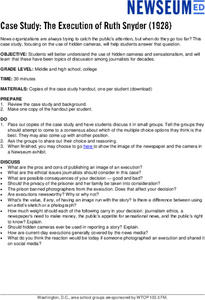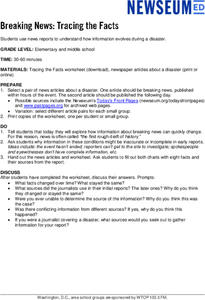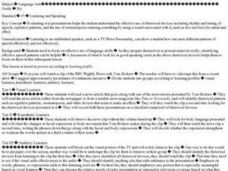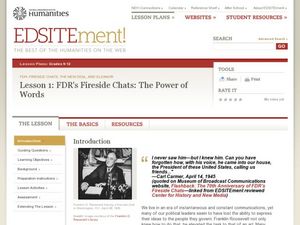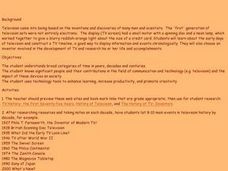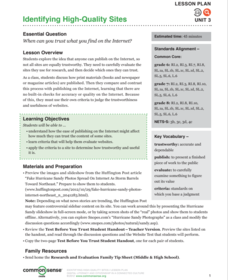PBS
What Makes A Good Video Report?
As part of a media literacy unit, class members establish criteria for good video reporting, and practice giving both positive (warm) and constructive (cool) criticism.
American Press Institute
Media Literacy: Where News Comes From
What actually happens at a press conference? Make sense of the mayhem with a mock press conference activity designed to promote media literacy. Individuals participate as either members of the press or the governor's office to examine...
Newseum
Case Study: The Execution of Ruth Snyder (1928)
The case of the 1928 execution of Ruth Snyder takes center stage in a lesson that asks young journalists to consider the ethics involved in publishing an image of an execution. A series of discussion questions ask individuals how they...
Newseum
When the News Media Make Mistakes
Mistakes happen. When they happen in news reporting, be it in print or on the internet, journalism ethics requires that the errors be corrected. Young journalists use an Accuracy Checklist to track how news organizations post corrections...
Newseum
Civil Rights: Chronicling the Movement
Scholars investigate events in the civil rights era in their community and develop a multimedia presentation of their findings. They compare local events with national events discussed on a NewseumED timeline.
Newseum
Civil Rights News Coverage: Looking Back at Bias
Not all southern newspapers covered the civil rights movement of the 1950s and 1960s. Young journalists investigate how The Lexington (Ky. Herald-Leader and The Jackson (Tenn.) Sun re-examined their coverage of the movement. After...
PBS
Decoding Media Bias
Alternative facts? After watching the We The Voters film, "MediOcracy," viewers compare how cable news outlets CNN, Fox News, and MSNBC report the same story about politics or public policy. After a whole-class discussion of their...
Newseum
Free Press Challenges Through History: Analyzing Historical Sources
The debate over the integrity of stories in media is not new. Young journalists analyze historical sources that reveal freedom of the press controversies and draw parallels to challenges freedom of the press faces today.
Newseum
Covering a Catastrophe: Press Conference Simulation
Young journalists have an opportunity to experience the challenges of covering a catastrophe by staging a mock press conference. Half the class acts as reporters while the others act as officials from the mayor's office.
Newseum
Breaking News: Tracing the Facts
Breaking news reports can be short of facts. Young journalists select a pair of news articles about a disaster; one published within hours of the event and the second published the following day. They examine whether facts in the report...
Newseum
News About My Community
After researching statistics about their community in local census reports, young journalists interview a resident about their interests and then analyze a local newspaper or homepage to see how similar the stories are to the residents'...
Facebook
Versions of Media Texts
Verification of provenance and the original source of an image or video can be a long and winding process. Young journalists learn about the difficulty of finding the original source of a scrape, a copy of an original news story, and...
Curated OER
Orchestrated Hell
Students evaluate a radio broadcast by correspondent Edward R. Murrow as a primary historic source. The broadcast, popularly known as "Orchestrated Hell" recounts Murrow's experiences with a Royal Air Force bomber crew on a raid over...
Curated OER
Evaluating Oral Presentation
Sixth graders examine the use of rhetorical devices in oral presentations. In this rhetorical device lesson, 6th graders watch a newscast of a major TV news personality to observe how speech patterns and rhythms are used effectively....
Curated OER
News Anchor
High schoolers view selected clips from news programs, analyzing the volume, stress and pacing of the deliverance. They prepare and deliver a one-minute presentation based on a current news story.
Curated OER
Cloud in the Classroom
Students watch a video about wild stallions and conduct research about wild horses and wildlife photography. Students explore the relationships between animals and humans and conduct Internet research about the treatment of wild horses...
Curated OER
Sculptured Landscapes
Students research glaciers, how they are formed and what kind of landforms they carve out of the rock they pass over. They organize their findings into a mock newscast in a presentation for the class.
Curated OER
A Connecticut Yankee in King Arthur's Court
Students create a presentation in which they retell the events of A Connecticut Yankee in King Arthur's Court. In this A Connecticut Yankee in King Arthur's Court lesson plan, students are introduced to Mark Twain in a PowerPoint, then...
Curated OER
FDR's Fireside Chats: The Power of Words
High schoolers examine Franklin D. Roosevelt's Fireside Chats. In this presidential history lesson, students listen to the radio broadcasts of select FDR Fireside Chats. High schoolers analyze the effectiveness of his messages to the...
Curated OER
Character Education Podcasts
Students study character traits. In this character education lesson, students create podcasts highlighting a particular character trait. Students broadcast one podcast per week.
Curated OER
Using the Commentaries in Class
Students examine language and communication by listening to a commentary radio show. In this communications lesson, students listen to Michael Josephson's radio broadcast using the Internet and analyze his words and their meaning....
Curated OER
History of Television
Students investigate the history of Television by using the Internet. In this timeline instructional activity, students discuss and take notes on the 10 main events in Television history and create a timeline through education software....
Common Sense Media
Identifying High-Quality Sites
Use a Huffington Post article focused on false pictures of Hurricane Sandy to launch a discussion about the reliability of online information. Groups compare and contrast how print and broadcast media regulate data gathering with the...
Curated OER
Weather
Students create a daily weather forecast including present temperature, high temperature, moon phase, sky watch, and occasional special reports dealing with weather phenomenon.
Other popular searches
- Public Broadcasting Service
- Television Broadcasting
- Broadcasting Activities
- Broadcasting Codes
- Radio Broadcasting
- Broadcasting Images
- History of News Broadcasting
- Weather Broadcasting
- Broadcasting News
- Broadcasting and Journalism
- Broadcasting (Journalism)
- Broadcasting Lessons




